NDTV: How Gautam Adani will run India's top news network
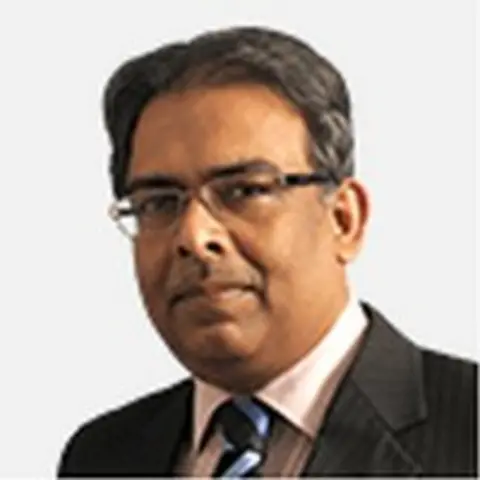
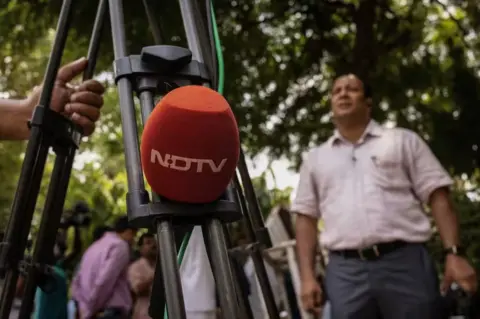 Reuters
ReutersRadhika and Prannoy Roy, founders of leading Indian news network New Delhi Television (NDTV), have resigned as directors of a group promoting their company, bringing a conglomerate led by Gautam Adani, one of the world's richest men, closer to taking over the media firm. The BBC looks at what this means for the future of TV news in India.
Radhika Roy once recounted that NDTV that she co-founded with her broadcaster husband Prannoy Roy was a "happy accident".
The Roys launched NDTV with a single show The World This Week on the bland state-run Doordarshan in November 1988 with "no grand plan" in mind and "certainly no idea" that it would grow from being a producer of a weekly world news show to India's first private 24/7 news network and independent news broadcaster.
More than three decades later, the couple's news channel is changing hands. Gautam Adani, the third richest man in the world - behind Elon Musk and Jeff Bezos - is set to buy NDTV in one the world's most tumultuous media markets.
Mr Adani, a 60-year-old billionaire who runs a port-to-energy conglomerate, is seen by many as someone close to Prime Minister Narendra Modi and his government. Truth to tell, his "relationship with political and social leaders, across all types of party lines, have made him acceptable to every government," according to RN Bhaskar, author of a recently published biography of the tycoon.
In March, Mr Adani's new company AMG Media Networks Limited bought a minority stake in Quintillion, a digital business news company. "The Quintillion investment is too meagre to demand Mr Adani's attention. So, does he have bigger plans?" wondered Mr Bhaskar in his book.
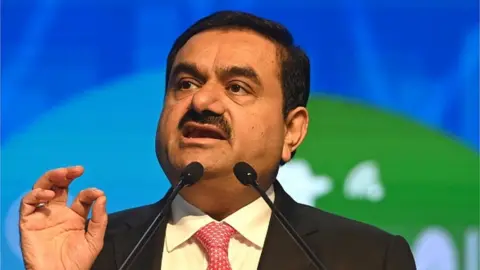 AFP
AFPNow we know. With revenues of around $51m and a modest profit of $10m, NDTV may not be a lucrative buy for Mr Adani, whose sprawling group has a market capitalisation of $260bn.
But NDTV is India's best-known network that pioneered data-driven vote analysis, morning shows, and a host of tech and lifestyle programmes on TV. Today, it has a robust online presence, claiming some 35 million followers across platforms.
NDTV, the Adani group believes, is "the most suitable broadcast and digital platform to deliver on our vision". Mr Adani has offered some clues about what the vision is. "Why can't you support one media house to become independent and have a global footprint? India does not have one single [outlet] to compare to Financial Times or Al Jazeera," he told the Financial Times.
Critics of the sale are more sceptical. Many regard NDTV as one of India's few independent news networks, which has stayed away from the shouty jingoism of many of its peers. A study by Oxford University and the Reuters Institute for the Study of Journalism found that 76% of respondents trust information from NDTV.
Mr Adani's takeover has sparked concerns that this would hurt its editorial integrity. Despite the diversity of media choices, independent journalism in India doesn't appear to be in fine fettle: the country dropped to 150 of 180 countries ranked in Paris-based Reporters Without Borders' World Press Freedom Index this year, its lowest position ever. Mr Modi's ruling Bharatiya Janata Party (BJP) rejects the findings, saying the index adopts a methodology that is both "questionable and non-transparent".
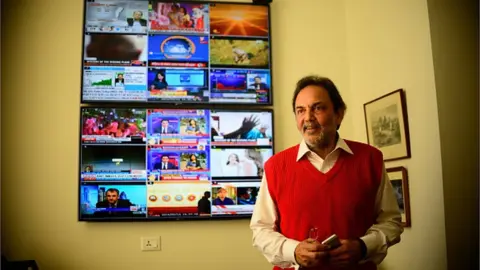 Getty Images
Getty ImagesThe diversity of media also masks the concentration of ownership, say experts. Four daily newspapers, for example, share three quarters of the readership in Hindi, according to Reporters Without Borders. Billionaire Mukesh Ambani, who owns a $220bn retail-to-refining conglomerate, also controls Network18, one of India's largest media companies. Companies owned by Mr Adani and Mr Ambani generate revenues equivalent to 4% of India's GDP.
The takeover of NDTV is also symbolic of the troubles plaguing the news business in India, says Vanita Kohli-Khandekar, a media specialist. India has more than 400 news channels in a market that is mostly privately owned and in regional languages. News channels mopped up an estimated 8% of the $423m that TV advertising got in 2021.
"News is one of the toughest business to be in, anywhere," says Ms Kohli-Khandekar. "In India, TV news is one of the most unprofitable, politically perilous and dodgy businesses to be in." Just "two to three companies" make money from time to time, she adds.
Since people are largely not willing to pay for news, advertising accounts for a bulk of revenues for the channels. Many believe the credibility of networks has waned: many have been accused of fiddling with ratings and what an expert called the "grotesque tabloidization" of news, and partisan coverage.
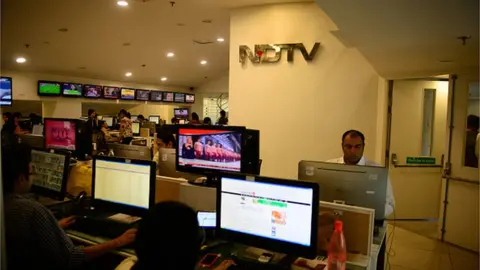 Getty Images
Getty ImagesNDTV's own financial woes began during an economic downturn more than a decade ago when it had to borrow $44m from a company controlled by Mr Ambani's Reliance Industries to refinance existing debts. "NDTV has struggled long and hard and it seems to be losing the fight. For the business of journalism it seems like a defeat," says Ms Kohli-Khandekar.
Time will tell whether the editorial content and tenor of the network will change under the new ownership. At a time when TV news is polarised, NDTV was "more left-of-the centre and did stories critical of the government which most others were not taking up," says Shailesh Kapoor of Ormax Media, a media consultancy. "Will they now soften their stand and move to a more neutral position because of editorial restrictions?"
Mr Adani believes there's nothing to fear. "Independence means if government has done something wrong, you say it's wrong," he told Financial Times. "But at the same time, you should have courage when the government is doing the right thing. You have to also say that."
